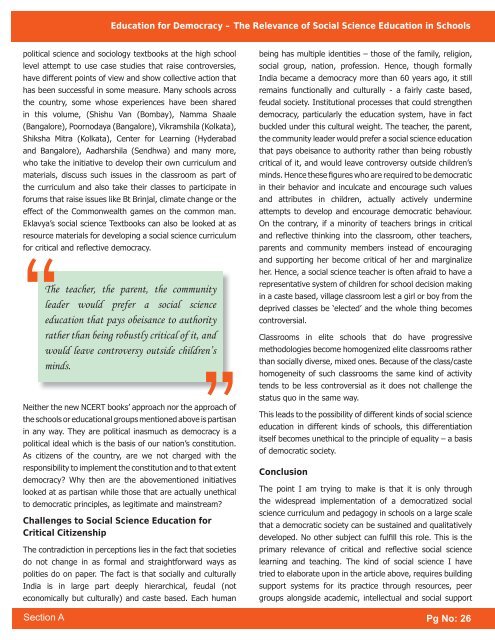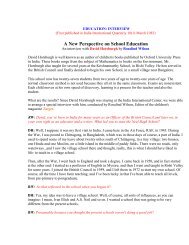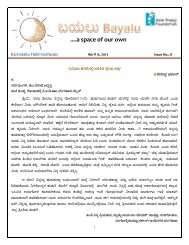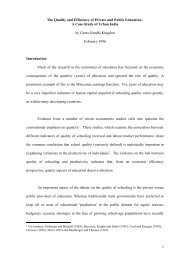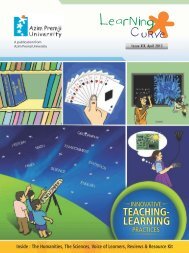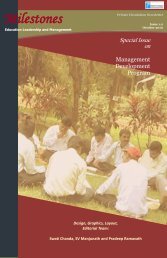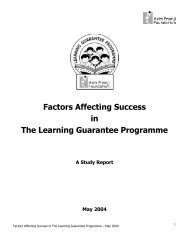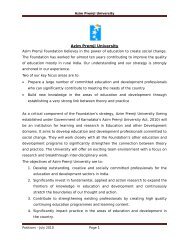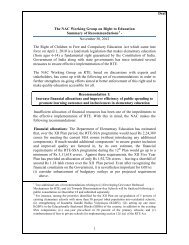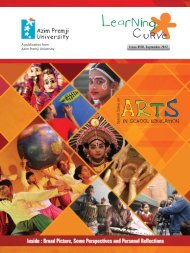Indesign Pagesnew.indd - Azim Premji Foundation
Indesign Pagesnew.indd - Azim Premji Foundation
Indesign Pagesnew.indd - Azim Premji Foundation
You also want an ePaper? Increase the reach of your titles
YUMPU automatically turns print PDFs into web optimized ePapers that Google loves.
political science and sociology textbooks at the high school<br />
level attempt to use case studies that raise controversies,<br />
have different points of view and show collective action that<br />
has been successful in some measure. Many schools across<br />
the country, some whose experiences have been shared<br />
in this volume, (Shishu Van (Bombay), Namma Shaale<br />
(Bangalore), Poornodaya (Bangalore), Vikramshila (Kolkata),<br />
Shiksha Mitra (Kolkata), Center for Learning (Hyderabad<br />
and Bangalore), Aadharshila (Sendhwa) and many more,<br />
who take the initiative to develop their own curriculum and<br />
materials, discuss such issues in the classroom as part of<br />
the curriculum and also take their classes to participate in<br />
forums that raise issues like Bt Brinjal, climate change or the<br />
effect of the Commonwealth games on the common man.<br />
Eklavya’s social science Textbooks can also be looked at as<br />
resource materials for developing a social science curriculum<br />
for critical and refl ective democracy.<br />
Neither the new NCERT books’ approach nor the approach of<br />
the schools or educational groups mentioned above is partisan<br />
in any way. They are political inasmuch as democracy is a<br />
political ideal which is the basis of our nation’s constitution.<br />
As citizens of the country, are we not charged with the<br />
responsibility to implement the constitution and to that extent<br />
democracy? Why then are the abovementioned initiatives<br />
looked at as partisan while those that are actually unethical<br />
to democratic principles, as legitimate and mainstream?<br />
Challenges to Social Science Education for<br />
Critical Citizenship<br />
The contradiction in perceptions lies in the fact that societies<br />
do not change in as formal and straightforward ways as<br />
polities do on paper. The fact is that socially and culturally<br />
India is in large part deeply hierarchical, feudal (not<br />
economically but culturally) and caste based. Each human<br />
Section A<br />
Education for Democracy – The Relevance of Social Science Education in Schools<br />
The teacher, the parent, the community<br />
leader would prefer a social science<br />
education that pays obeisance to authority<br />
rather than being robustly critical of it, and<br />
would leave controversy outside children’s<br />
minds.<br />
being has multiple identities – those of the family, religion,<br />
social group, nation, profession. Hence, though formally<br />
India became a democracy more than 60 years ago, it still<br />
remains functionally and culturally - a fairly caste based,<br />
feudal society. Institutional processes that could strengthen<br />
democracy, particularly the education system, have in fact<br />
buckled under this cultural weight. The teacher, the parent,<br />
the community leader would prefer a social science education<br />
that pays obeisance to authority rather than being robustly<br />
critical of it, and would leave controversy outside children’s<br />
minds. Hence these fi gures who are required to be democratic<br />
in their behavior and inculcate and encourage such values<br />
and attributes in children, actually actively undermine<br />
attempts to develop and encourage democratic behaviour.<br />
On the contrary, if a minority of teachers brings in critical<br />
and refl ective thinking into the classroom, other teachers,<br />
parents and community members instead of encouraging<br />
and supporting her become critical of her and marginalize<br />
her. Hence, a social science teacher is often afraid to have a<br />
representative system of children for school decision making<br />
in a caste based, village classroom lest a girl or boy from the<br />
deprived classes be ‘elected’ and the whole thing becomes<br />
controversial.<br />
Classrooms in elite schools that do have progressive<br />
methodologies become homogenized elite classrooms rather<br />
than socially diverse, mixed ones. Because of the class/caste<br />
homogeneity of such classrooms the same kind of activity<br />
tends to be less controversial as it does not challenge the<br />
status quo in the same way.<br />
This leads to the possibility of different kinds of social science<br />
education in different kinds of schools, this differentiation<br />
itself becomes unethical to the principle of equality – a basis<br />
of democratic society.<br />
Conclusion<br />
The point I am trying to make is that it is only through<br />
the widespread implementation of a democratized social<br />
science curriculum and pedagogy in schools on a large scale<br />
that a democratic society can be sustained and qualitatively<br />
developed. No other subject can fulfi ll this role. This is the<br />
primary relevance of critical and refl ective social science<br />
learning and teaching. The kind of social science I have<br />
tried to elaborate upon in the article above, requires building<br />
support systems for its practice through resources, peer<br />
groups alongside academic, intellectual and social support<br />
Pg No: 26


